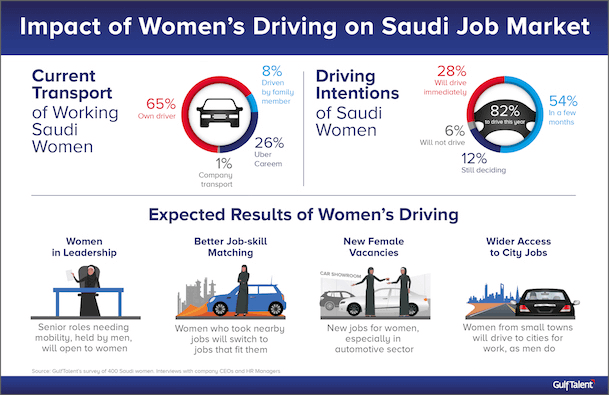Driving expected to empower Saudi women and contribute to their progression to senior leadership roles traditionally held by men
Many working women set to switch to more lucrative jobs when they can drive
Driving to create new jobs for women in the automotive sector, while more city jobs become accessible to unemployed women from small towns and villages
The employment landscape in Saudi Arabia will be transformed by the historic start to women’s driving which is about to take effect.
Based on the survey findings, an overwhelming 82% of Saudi women plan to take up driving this year. This is expected to contribute to more women growing into senior roles traditionally dominated by men, many women upgrading to higher paying jobs further away from their homes, and many currently unemployed women getting the opportunity to work.
Women’s Empowerment and Growth
Career advancement is a major factor in empowering women, which is one of the goals of Saudi Vision 2030. The GulfTalent survey found that women’s driving significantly enhances their chances of career progression, by giving them the mobility required for managerial positions and removing logistical barriers that have traditionally inhibited promotion to senior roles.
Hala, a Regional HR Manager at a construction company in Dammam told GulfTalent “Senior positions often involve working with employees in multiple offices across the region either within or outside the country, which was more difficult in the past without being able to drive. Now that women will be able to drive, more female candidates will likely be considered for senior roles that entail traveling to other offices.”
This was consistent with the experience of Saudi women surveyed. Mai, a project engineer based in Jeddah said “Being able to drive will make me eligible for the position of project manager – as the role needs constantly moving between the office and project sites to supervise work.”
Improved job-skill matching
GulfTalent’s survey predicts driving will lead to a wave of employed women moving to better matching and more lucrative jobs in other companies. Many of the survey respondents admitted that they previously had to settle for jobs with lower pay than their qualifications merited or unrelated to their interests and studies because of transport constraints. Many women surveyed affirmed they will be looking for better opportunities as soon as they are able to drive.
Sara, who holds a degree in computer science with 6 years work experience and is employed as a junior analyst in Jeddah, said, “I’ve had to settle for jobs with lower salaries than my educational qualifications merit, in order to stay close to home. Now I’ll be able to look for better employment.”
This view was echoed by several employers surveyed. One HR Manager based in Jeddah told GulfTalent “We will now be able to hire more female staff for sales positions and other jobs requiring work outside the office.”
New jobs for women
The Saudi government’s Vision 2030 aims to raise women’s participation in the workforce from 22% to 30%. The new opportunities created by women driving are set to contribute to achieving this goal.
According to GulfTalent’s study, a key segment benefiting from driving will be women in villages and small towns, many of them teachers, who need to commute to jobs in larger cities. With long-distance public transport limited and costly, many of these women have historically been unable to work at all. “The ability to drive will allow women to commute to work in the cities from more remote locations in the same way that their male counterparts have been doing for years.” said Turki Almadhi, founder and president of TAVI, an investment firm with offices in Riyadh.
One survey respondent, Lena, who lives near Riyadh, said “Now I can commute for work to other cities without fear of sitting in a car with a man that I don’t know and am unrelated to.”
By 2020, an estimated 3 million women are forecast to be driving in Saudi Arabia, according to research by audit firm PwC. As a result, the Kingdom’s automotive sector is expected to see a significant boost in demand, leading to creation of many new jobs in the sector, including a large number of female employees to cater for the new breed of female car owners. Transport services such as Careem and Uber have already announced plans to hire thousands of female drivers.
Survey Methodology
GulfTalent’s research was based on an online survey of 400 Saudi women based in Saudi Arabia, interviews with 25 Saudi women, and senior executives of 10 employers active in Saudi Arabia. Female survey participants were aged 20 to 60, and included those already working as well as seeking employment.


